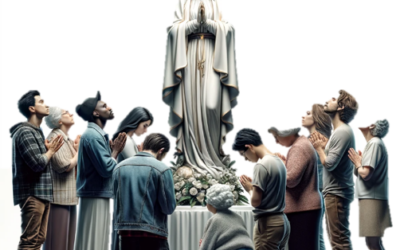Buddhism and Christianity make mutually exclusive truth claims at nearly every essential point. There is simply no way to combine these two systems without completely redefining one or both of them. Since the 1960s, however, as Buddhism has made increasing inroads into western life and as American culture has become more and more pluralistic, one can increasingly find people who self-identify as being both Buddhist and Christian. The argument for this (when one articulates an argument at all) usually goes something like this: Buddhism (it is claimed) is agnostic on the issue of God. There is nothing (it is further claimed) inherently contrary to Christianity in Buddhist thought and practice, and so one can be devoted to the Christian God by following the Buddhist path to enlightenment. These claims are both entirely false, however, and thus the conclusion that follows from them is also false.
Buddhist Agnosticism?
Historic Buddhism acknowledged the existence of a variety of gods and demigods above and beyond humanity but taught that they were mortal creatures that were a part of the same cycle of death and rebirth as men and animals. They were a part of the Buddhist cosmos but were not prescribed as objects of Buddhist devotion. They were bound in the world of suffering and needed enlightenment to realize Nirvana just as men do.1
Regarding such gods, Buddhism can truly be agnostic. Many modern, western Buddhists reject the notion of gods, and it does not in any way hinder them from being Buddhist. Such gods are not central to any Buddhist teaching, and it makes no difference to Buddhist doctrines whether or not they are there any more than the existence or nonexistence of a particular type of animal would. The gods are merely one of the varieties of beings suffering in the cycle of death and rebirth from which Buddhism seeks liberation.
The Christian God is not like this, however. When Christians speak of God, they are not speaking of a mortal, finite, suffering being like any other being. They are not speaking of a being in need of liberation from anything. They are not speaking of a being that is merely a part of the system of things. They are not speaking of a being that may or may not exist. They are speaking of an eternal, perfect, unchanging, all-sufficient creator of everything that is and to whom we all owe our worship and answer to as our Judge and King. In this sense, Buddhism does not believe in God. Indeed, Buddhism cannot possibly allow for such a God’s existence.2
Central to Buddhism is the impermanence of all things and the doctrine of no distinct and enduring self in existence.3 If there is anything eternal and unchanging, Buddhism is false. If, as Colossians 1:16-17 says, “all things have been created through Him and for Him. He is before all things, and in Him, all things hold together,” then one cannot say that all things are impermanent and do not hold together at all, or that there are no actual things. Anyone claiming to be both Buddhist and Christian must either radically alter Buddhist teaching on almost every possible subject, or else they must drastically change what they mean by “God” to such a degree that it is no longer recognizable as anything remotely Christian.
Buddhist and Christian teaching
Man: Buddhism teaches that a personal self is an illusion. There is no “I” or “you” even now, and certainly no soul or spirit of man that transcends this physical life.4
Christianity teaches that men and women are created in the image of God and are distinct from and have dominion over other living things on the earth, (Genesis 1:26-28). The person developing in the womb is the same person all the days of their life (Psalm 139:13-16). There is conscious existence after death (Luke 16:19-31), and these same personal selves will rise again on the last day (Acts 24:15), some to eternal life and others to eternal condemnation, (John 5:28-29).
Sin: Buddhism teaches that there is no moral right and wrong. Good and evil are a false duality that the enlightened must overcome.5 Rightness and wrongness are merely subjective,6 a distinction we make artificially out of convenience.7 Justice and injustice, Buddhism explains, are potentially dangerous concepts rooted in the false notion that there is a Creator God who rules and judges us all.8
Christianity teaches that there is such a God and that there is indeed objective right and wrong. Evil, or sin, is breaking the commands of God (1 John 3:4) and falling short of His standard (Romans 3:23). We have a duty not only to avoid evil but also to do what is good (Galatians 6:9-10) even to those who hate us (Luke 6:27). Indeed, knowing what is good and not doing it is itself evil (James 4:17). The concepts of righteousness and wickedness, good and evil, obedience, and sin; are quite central to everything that Christianity has to say.
Suffering: In Buddhism suffering comes from our illusion of being a personal self and our actions in accordance with that illusion.9 Because we think we exist as distinct and enduring selves separate from other objects, we desire things and become attached to things that are, in fact, fleeting and illusory. From this comes suffering. It is not merely unhealthy or improper desires, but rather all personal desires that cause our suffering.10
Every volition, every act of the will, is karma and perpetuates “samsara,” or the cycle of death and rebirth.11 The Buddhist must learn to be free from all desires, no longer pursuing what is pleasant and avoiding what is painful or thinking of one experience as preferable to another.12 He must cease to praise what is good or bemoan what is evil, abandoning all such duality.13 This is the Buddhist freedom from suffering.
In Christianity, it is human evil and disobedience to God that first brought suffering and death into the world, (Romans 5:12). What man needs most is to be washed of his guilt and to turn from his sin. While Christians believe that selfish human desires are what lead us into temptation and sin (James 1:14) and that much suffering and strife come from wrong-headed desires that go unfulfilled (James 4:1-3), nevertheless there are also righteous desires that ought to be cultivated. There is a blessing for those who hunger and thirst for righteousness (Matthew 5:6), and we are to seek earnestly and consistently after the kingdom of God (Matthew 6:33). In the end, God will satisfy the righteous desires of those who are in Christ. He will bless them with eternal life and remove their suffering forever, (Revelation 21:3-4).
Salvation: Different Buddhist branches prescribe a variety of different things regarding the most effective path to enlightenment and escape from the suffering of life and the cycle of death and rebirth. At a minimum, however, all hold to the centrality of adherence to the Eightfold path laid out by Buddha for one to escape the suffering cycle through the self-disciplined reshaping of one’s thoughts, views, speech, and actions.14 As one ceases from karmic action, personal desire, and the illusion of self-existence, one attains to enlightenment, realizes Nirvana, and thus transcends suffering and the cycle of rebirth.
In Christianity, salvation is the forgiveness of sins and bodily resurrection unto eternal life with God. This is not earned or merited but is the gracious gift of God which we receive through repentance and faith. (John 3:16-21)
Eternity: The Buddhist hope is for the realization of Nirvana. Nirvana means to blow out or extinguish, like a flame deprived of air or exhausting its fuel.15 It is not the extinguishing of one’s personal existence since Buddhism insists there never was any personal existence to extinguish, but rather the extinguishing of the illusion of personal existence.16 It is an end to desire, longing, craving, or the idea of oneself as a distinct and separate thing.17 It is not a place that one enters or a state one acquires. It is simply the realization of what is already the ultimate reality. Rebirth is then at an end, suffering ceases, desires are done away with, and all simply “is.”
The Christian eternity could not be more opposite. Personal existence continues for all, some to everlasting life and others to everlasting judgment, (John 5:28-29). Those who are saved from their sins in Jesus Christ have eternal bodily life without pain or suffering in the very presence of God, (Revelation 21:3-4). Those who remain in the guilt of their sins are punished for their evil forever in hell, “And the smoke of their torment goes up forever and ever; they have no rest day and night,” (Revelation 14:11).
Conclusion
This mere sampling from some of the most central teachings of Buddhism and Christianity is by no means exhaustive of the differences but should suffice to show that these two religions are utterly incompatible. Indeed, it would be difficult to conceive of two belief systems that more fundamentally disagreed on even the most basic concepts of foundational truth. Any professing Christian seeking to embrace the philosophy of Buddha is necessarily also seeking to deny the gospel of Jesus Christ. This is no trifling matter.
References
| 1↑ | Keith Yandell and Harold Netland, “Buddhism: A Christian Exploration and Appraisal” (IVP Academic, 2009) 21 |
|---|---|
| 2↑ | Ibid, 183-184 |
| 3↑ | ”The Teaching of Buddha” (Bukkyo Dendo Kyokai, 1966) 298 |
| 4↑, 8↑ | Walpola Rahula, “What the Buddha Taught: Revised and Expanded Edition with Texts from Suttas and Dhammapada” (Grove Press, 2007) Kindle Edition, Chapter 6 |
| 5↑, 13↑ | ”The Teaching of Buddha” (Bukkyo Dendo Kyokai, 1966) 62 |
| 6↑ | Thich Nhat Hanh, “The Heart of the Buddha’s Teaching” (Broadway Books, 1998) 56 |
| 7↑ | ”The Teaching of Buddha” (Bukkyo Dendo Kyokai, 1966) 53 |
| 9↑ | Rodney Smith, “Stepping Out of Self Deception” (Shambhala Publications, 2010) 4 |
| 10↑ | Keith Yandell and Harold Netland, “Buddhism: A Christian Exploration and Appraisal” (IVP Academic, 2009) 16 |
| 11↑ | Walpola Rahula, “What the Buddha Taught: Revised and Expanded Edition with Texts from Suttas and Dhammapada” (Grove Press, 2007) Kindle Edition, Chapter 3 |
| 12↑ | Rodney Smith, “Stepping Out of Self Deception” (Shambhala Publications, 2010) 6 |
| 14↑ | Walpola Rahula, “What the Buddha Taught: Revised and Expanded Edition with Texts from Suttas and Dhammapada” (Grove Press, 2007) Kindle Edition, Chapter 5 |
| 15↑ | Houston Smith and Philip Novak “Buddhism: A Concise Introduction” (HarperCollins Publishers, 2003) 51 |
| 16↑ | Walpola Rahula, “What the Buddha Taught: Revised and Expanded Edition with Texts from Suttas and Dhammapada” (Grove Press, 2007) Kindle Edition, Chapter 4 |
| 17↑ | Keith Yandell and Harold Netland, “Buddhism: A Christian Exploration and Appraisal” (IVP Academic, 2009) 23-24 |





